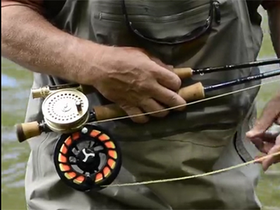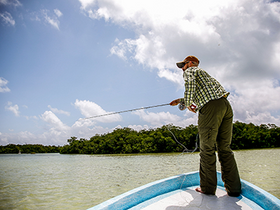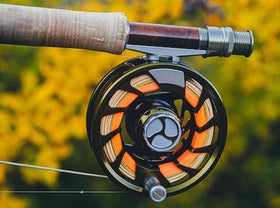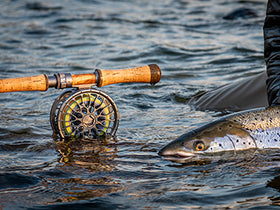
Arguably Greg's best work. If you're passionate about wild places or flyfishing Tasmania, this is a must read.
A living history of Lake Malbena and the Western Lakes, by Greg French
Wild Heart of Tasmania is a lively collection of stories centred around a highland wilderness. It portrays bushwalking and backcountry fishing as a way of life, and historic bush huts as social fabric.
In the early 2000s, Greg French was approached by a talented young fly fisher to write a foreword to a proposed book. Greg helped the aspiring author and shared his most treasured backcountry destinations. Then bewildering events surrounding a quaint hut on a remote island turned everything on its head.
The application for a commercial development in the middle of one of Tasmania's most treasured wilderness zones blindsided traditional users. Subsequent events blindsided the State Government and the developer. No one could have guessed how much national media coverage would be generated by the ostensibly tiny Lake Malbena proposal.
What is it about the Western Lakes that fuels such passion? Where does lifelong and multi-generational attachment to the land fit into the narrative? What are the ramifications for ecotourism in Tasmania? And why should any of this matter to the rest of Australia?
Wild Heart of Tasmania is an inspirational tale for those who love wild places and wildlife, and a cautionary one for those who believe Australia's national parks to be well protected and its democracy sacrosanct. Quirky communities and quirky people never seemed so important.
Hardback 448 pages.
Publication Date 25 Jul 2023
This review on the book comes from Philip Weigall at FlyStream.com
Where to start when describing this new book? Perhaps I could begin by quoting the subtitle: ‘A living history of Lake Malbena and the Western Lakes’, although that would be a bit like describing flyfishing as ‘fishing with a piece of fluff tied to a hook.’ Strictly speaking accurate, but also vastly inadequate.
In fact, ‘Wild Heart of Tasmania’ is so much more, it’s difficult to know where to begin. At the book’s core is Lake Malbena; if not geographically in the centre of Tasmania’s Western Lakes wilderness, then certainly a place surrounded by the best of it.
For those who don’t know Malbena’s recent backstory, this lake (and its island) is in the Walls of Jerusalem National Park, part of Tasmania’s designated World Heritage Area. Cocooned within such a highly protected zone, Lake Malbena would normally be considered about as safe from overt human interference as you can get. Malbena was somewhere we were all welcome to camp, walk to and fish; far from the intrusions of everyday life.
Except this is Tasmania, the state that seems to bring out the very best – and worst – in conservation outcomes. So, the short story is that, despite its supposed ‘gold standard’ protection, there’s an ongoing proposal to develop Malbena into a mini resort of sorts, complete with what is effectively exclusive access for paying guests, including a helicopter ride to get there.
The years-long struggle by Greg and countless others to prevent this outcome could easily be the basis for a book all on its own. However, instead, Greg has taken the opportunity to also offer a meticulous history of the Western Lakes as a whole. We learn of the original Indigenous inhabitants and then the early trappers and shepherds.
Last came the recreational hikers, fishers and explorers, with their tracks and huts. It turns out that even a hundred years ago, the Western Lakes wilderness was a keenly sought and highly valued refuge from ‘modern’ life. Mixed in are accounts of natural history, particularly bushfires which have scarred parts of the wilderness, and spared others.
Against this background, Greg chronicles the area’s chequered conservation past, including (ironically) attempts not so long ago by bureaucrats to actually limit visitation by everyday walkers and fishers.
And then, of course, there are the fishing stories. There’s Greg’s own angling journey, in which the Western Lakes play a key role. We also read about unforgettable hatches, unexpected tailers, remote lakes, trophy lakes, and even lakes with no trout!
While all this is fascinating and compelling, the layer which raises ‘Wild Heart of Tasmania’ from good to great, is its very human element. Greg’s relationships have always been an indispensable element in his writings: friends, family, work colleagues, passing acquaintances, adversaries and so on. Knowing some of the background to this book, I half expected an angry diatribe, but it is remarkable how measured and lacking in bitterness it is, which only makes the book more credible and readable. Somehow, Greg manages to be informative and fair as he intertwines all the threads. In this narrative, there are few absolute saints – or sinners.
On to more practical considerations, and ‘Wild Heart of Tasmania’ is beautifully produced in hardback, with detailed maps and colour pictures to enhance the text, which runs to nearly 480 pages.
At the time of writing, the Malbena saga is yet to be resolved one way or the other. But whatever the ultimate outcome for this beautiful piece of Tasmania – and in effect for the much larger Western Lakes – we should never forget Greg’s words towards the end of the book: ‘The sad fact is, every conservation win is temporary, and every loss permanent.’
If you value public access, and the preservation of wild places for the benefit of nature and people, this book truly is essential reading.





